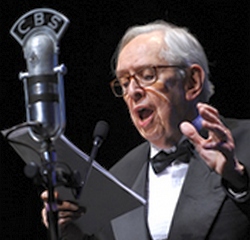I’ve had to start putting notes on the more obscure people I cover for these columns because of how far out I am. For today, I had someone on the schedule about whom I have nothing to say. The person does appear to exist, and they have one credit on IMDb. It’s soundtrack for a movie I’ve never heard of. It’s also possible that I managed to conflate two people, both of whom are dead, who were father-in-law and son-in-law and possible entrants for the column at some point. At this point, I have no idea; I don’t even know for sure if the person whose name is on the list is alive or dead, because there’s no biographical information on his IMDb page. However, I want to do a little grouping of the two possibles, plus the father of one of them, so they’re going to be next year.
Instead, let us today discuss Arthur Anderson, one of the many people I don’t picture, I hear. In fact, my kids can hear him, too. Now, they’re not familiar with his early radio work. That stems back to when he was a child, among other things appearing as Jim Hawkins on the second episode of The Mercury Theatre on the Air. No more are they terribly familiar with his nearly thirty-year career as the voice of Lucky, the Lucky Charms leprechaun. However, they are both awfully familiar with Eustace Bagge, husband of Muriel and therefore co-owner of the eponymous Courage, the Cowardly Dog.
Which is all pretty interesting, but what I’ve discovered while looking further into him is that the entirety of the film Me and Orson Welles is based on a picture of him. Not his actual life, no—people have criticized me for my insufficient research, but I’m writing quickie five-paragraph essays on two different people a week. Novelist Robert Kaplow saw a photo of Anderson as Lucius in the Orson Welles Caesar, his anti-fascist Julius Caesar, and basically invented the story. Oh, he talks about interviewing Anderson for it, true, but the story we see onscreen bears very, very little resemblance to the story as it happened. It’s not even that Zac Efron was seven years older than Anderson had been, either.
One thing from the movie that is true, sort of, is that Anderson set off the sprinklers in the theatre during a performance, apparently with a match. Welles mentioned it on the air and mentioned that Anderson was a fine, talented actor who’d always have a job with the Mercury. Which honestly makes me wonder why he’s not in Kane. Easy enough to say there’s not really a role for him; why didn’t Welles write a role for him? As it was, Anderson didn’t make his first movie until 1950 and did a lot more stage than screen in his life. Except for Lucky, of course, and the second voice of Eustace.
Well, maybe he preferred the stage, for all that. He does seem to have liked being the voice of Lucky and being asked to sing the jingle for people all the time, too. But if he wasn’t scared away from working for Welles the time he accidentally stabbed the guy playing Julius Caesar—well, that’s why God invented stage daggers, Orson, even if they don’t twinkle in the light the same way—it’s hard to imagine his being scared by much of anything else. And we know he wasn’t, because we know he finished out the production and kept working for Welles, unlike the twink they based on him.
Reward me for burying the lede on stories like “Orson Welles accidentally stabbed a guy on stage once” by contributing to my Patreon or Ko-fi?

